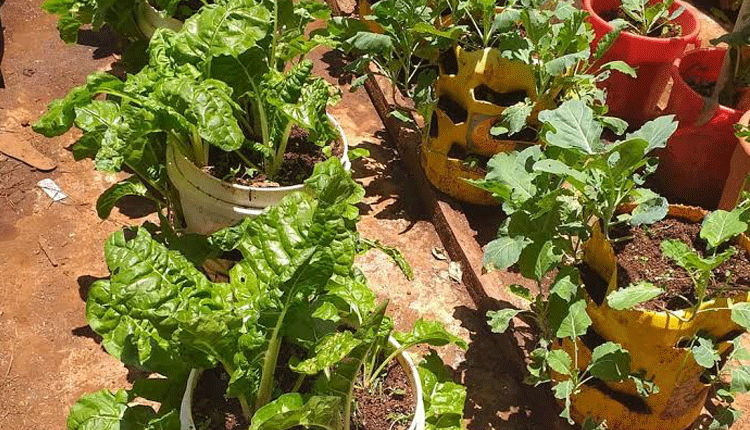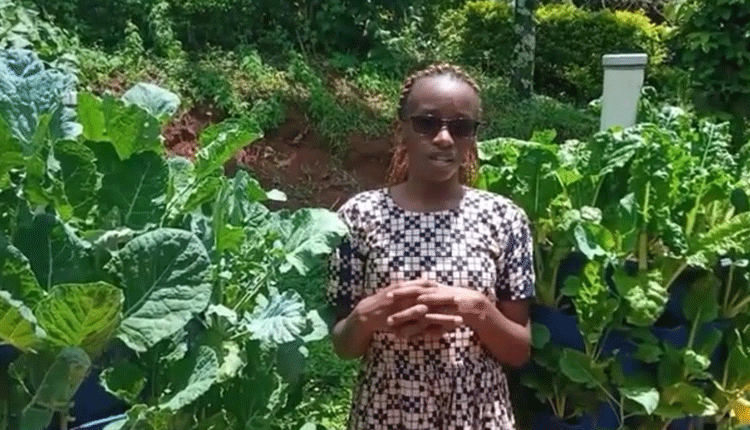Mastering the art of converting small spaces into gardens
By Kwach Wakhisi, August 31, 2021Has the thought of turning that small space in your home or compound into a kitchen garden ever crossed your mind? It can be your balcony, rooftop or even your backyard.
Well, Elizabeth Koigi, founder of Ndogo Farms, an organic farm in Murang’a county is doing exactly that and is helping farmers, especially in urban areas make that a reality.
Through the initiative, she helps people turn their small spaces into gardens by maximising space available to ensure easy access to fresh and organically grown vegetables and other food crops.
“The small spaces in your home should not be ignored. You don’t need a lot of space to grow your vegetables and herbs.
That small space you look down upon can get you good yields, more than enough for your family, and even sell the remainder for a profit,” she says.
Passion for environment
She adds that some of the crops that can be grown in these small spaces include potatoes, strawberries, carrots, cabbages, sukuma wiki, peas, lettuce, spinach, African night shade (managu), amaranth (terere) and dwarf fruit plants.
“Most people only want to grow vegetables, but it’s good to diversify since different plants consume different nutrients.
Vegetables usually consume a lot of nitrogen hence if intercropped with legumes, such as beans, which fixate nitrogen in the soil, the yields will be better,” she says.

Born and raised in Lari constituency, Kiambu county, and a Bachelor of Education (Science) graduate at Karatina University, Elizabeth loves and has always had a passion for innovation in areas revolving around environmental issues.
“I wanted to be part of those working to reduce carbon footprint in urban areas where most of the carbon emissions occur in high concentration,” says the mathematics and chemistry teacher at Gitura Secondary School in Murang’a county.
Elizabeth traces her passion in agricultural systems back in Kamandura High School when she came across an article about biogas systems and hydroponic farming in Kenya.
“I fell in love with both concepts and wanted to try them out to see whether they would succeed. I began carrying out in depth research when I joined campus,” she recounts.
After her undergraduate studies in 2015, and while working at a school in Murang’a, she tried to create a biogas prototype during her spare time.
“Later on, I received funding from a pollination project and I managed to complete my first prototype, which was a big flop since the weather conditions in the region did not favour the systems. The systems are highly affected by temperature changes,” she recalls.
“I decided to create the second prototype, but this time in a warmer area, Kitengela in Kajiado county.
The system worked well, but I couldn’t continue with the project because I was expectant and biogas making is labour intensive,” she adds.
Hydroponic farming
Meanwhile, she was also trying her hands in hydroponic farming.
“I tried hydroponic fodder with maize and wheat, which worked well, and 2018 after the birth of my daughter, and after doing a lot of research on urban gardening, I founded Ndogo Farms,” she smiles.
Elizabeth says the knowledge she had gained from making biogas helped her succeed in setting up the farm.
“I started converting 10 and 20 litre-jerry cans and drums into vertical gardens at my home into planters,” she narrates.
According to her, the uptake from the public has been amazing and so far, she has managed to train about 150 people.
“When we first started selling the systems in September 2019, we managed to install the vertical gardens during the six-month period before Covid-19 pandemic struck.
The demand went higher as people had been confined in their homes in 2020 due to the pandemic.
But we couldn’t supply the systems due to logistic and cost challenges, since we are based in Murang’a and most of our clients are in Nairobi,” she says.
She adds, “I decided to utilise this time to learn more about urban gardening, mainly organic farming, and how it can be effectively done.”
She went on to introduce new concepts, such as raised beds and container gardening since different crops require different systems, especially deep rooted plants and tubers such as carrots, cabbages and even potatoes.
Despite her growth, there have been a few challenges, mainly cyber bullying. “I once posted my products on Facebook and the reactions I got were very discouraging.
I decided to take a break from everything and regroup. I had to come to terms that one doesn’t have to allow the negative vibes to affect you. Being a woman in this field is tough.
We need to show people that we can also excel in science-related fields,” she says.
Another challenge of farming in small spaces, especially when it comes to containers, is when one has to only use soil.
“Soil tends to be compact and it becomes difficult growing crops in the next season, hence we encourage our clients to use potting mixture, which is a combination of different types of substances, such as cocopeat (the spongy white tissue inside a coconut husk) that ensures the mixture is well aerated and has good water retention. Intercropping should also be done regularly,” she offers.
As urbanisation continues, Elizabeth hopes that people will accept the idea of not only farming in small spaces, but also practice indoor farming in urban areas.
“If we improve the concept of urban gardening, our urban areas will be green with plenty of food.
As we put healthy food on our tables, we are also reducing the carbon emissions leading to a healthier environment and lifestyle,” she says in conclusion.
